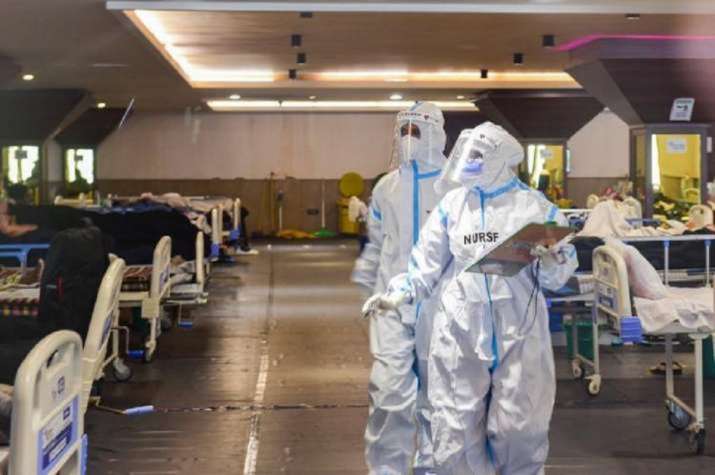
Spread of delta version of COVID-19 will put a lot of pressure on healthcare: WHO
The World Health Organization (WHO) has warned against increased transmissibility linked to the delta variant of COVID-19, saying it is likely to lead to a significant increase in cases and to put more strain on health systems, especially with low vaccine coverage. with reference. In its COVID-19 weekly epidemiological update released on Tuesday, the World Health Organization said that all WHO regions have reported an overall increase in COVID-19 cases due to the delta variant.
As of 13 July, at least 111 countries, regions and territories have reported detection of the delta variant, and this is expected to increase, becoming the dominant variant globally in the coming months.
“The increased transmissibility associated with delta variants is likely to lead to a substantial increase in case incidence and greater pressure on health systems, especially in the context of low vaccine coverage,” it said.
Globally, 178 countries, regions or regions have reported cases of the alpha version, while 123 countries have reported cases of the beta version, 75 countries have reported cases of the gamma version.
The update states that the delta variant has shown higher transmissibility than the other Variant of Concern (VOC) identified till date.
“The increased transmissibility means it is likely to become the dominant version globally in the coming months,” the update said.
It added that relaxation and inappropriate use of public health and social measures (PHSMs) and social mobility in many countries and the emergence of more infectious forms with mixing and low vaccination coverage are contributing to the rapid increase in incidence, hospitalization is. deaths in many countries
“Furthermore, in large parts of the world, gaps remain in epidemiological surveillance, testing and genomic sequencing, and this can limit our ability to monitor and assess the impact of current and future variants in a timely manner. limits,” it said.
The update noted that as countries gradually resume non-essential international travel, risk mitigation measures will be introduced to “reduce travel-linked exports, imports and further transmission of SARS-CoV-2.” should be based on systematic and regular risk assessment.”
Nearly a quarter (24.7 percent) of the world’s population has received at least one dose of the COVID-19 vaccine – more than three billion doses administered. However, there are huge disparities in vaccine delivery and administration, with most vaccines administered in a small number of high- and upper-middle-income countries.
Updates to the COVAX facility are working to bridge this gap, but a large proportion of the world’s population remains susceptible to SARS-CoV-2 infection.
“The breadth and quality of evidence for the efficacy and effectiveness of existing vaccines against emerging variants remains limited; nevertheless, the available evidence suggests that full vaccination provides a high level of protection against severe disease and death for all four VOCs.” There is mixed evidence of an effect on infection, mild-moderate disease, and transmission.
“The phenotypic effects of all variants, including virus development and potential immune evasion, require close monitoring and evaluation, with potential need for future adjustments to vaccine composition, vaccination strategies and/or coverage targets,” it said. said.
The global number of new cases reported last week (July 5-11, 2021) stood at around 3 million, up 10 percent from the previous week. The update said that after nine consecutive weeks of decline, the number of weekly deaths increased by 3 percent this week compared to the previous week, which saw more than 55,000 deaths.
Globally, the incidence of COVID-19 increased by an average of over 4,00,000 cases every day, compared to 3,70,000 from last week.
The cumulative number of reported cases globally now stands at over 186 million and deaths exceed 4 million.
This week, all regions except the US registered an increase in incidents. The eastern Mediterranean region recorded the highest increase (25 per cent) in incidence, followed by the European region with a 20 per cent increase over the previous week.
The African region had the lowest percentage increase in incidence, with a 5 percent increase. However, the region registered a 50 percent increase in the number of deaths compared to the previous week.
The South-East Asia region also registered a significant increase in the number of deaths, registering a growth of 26 per cent over the previous week. The US territory also saw a 3 percent drop in incidents and an 11 percent decrease in the number of deaths recorded last week.
The update said that the highest number of new cases were reported from Brazil (333,030 new cases; a decrease of 9 percent), India (291,789 new cases; a decrease of 7 percent), Indonesia (243,119 new cases; an increase of 44 percent). United Kingdom (210,277 new cases; an increase of 30 percent) and Colombia (174,320 new cases; a decrease of 15 percent).
In the Southeast Asia region, the highest number of new deaths were reported from India (6,035 new deaths; 0.4 new deaths per 100,000; a decrease of 4 percent), Indonesia (5,882 new deaths; 2.2 new deaths per 100,000; a 71 percent increase) and Bangladesh (1,354 new deaths; 0.8 new deaths per 100,000; 52 percent increase).
(with PTI inputs)
.